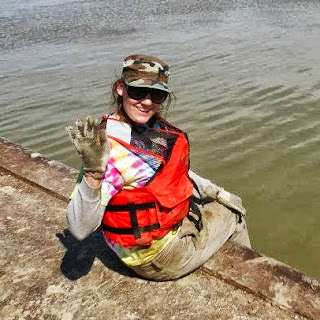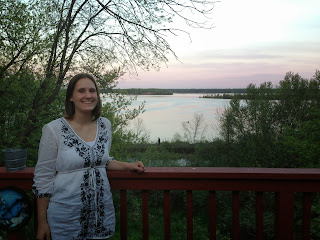March 11th, 2015 by iisg_superadmin
Earlier this year, AP science students at Chicago’s Lane Tech College Prep traded in their textbooks for field equipment to study water quality in the North Branch of the Chicago River. The Hydrolab allows students to monitor water characteristics like dissolved oxygen, pH, and conductivity with sensors similar to those used by scientists at the EPA Great Lakes National Program Office. The teacher, Dianne Lebryk, borrowed the equipment through the Limno Loan program to help students better understand the connection between water quality and man-made landscapes.
Several students wrote in to share their experiences working with the Hydrolab. We wrap things up today with Gayin Au.
Under the circumstances of an extremely frosty cold weather, our environmental classmates were still very eager to head out and experience the Hydrolab. As soon as we reached the river by our school, we saw a lot of trash in the river. The water looked very dense and had a very dark green color.
Two people were responsible for holding the Hydrolab since it was quite heavy. The others stood back to watch. I was surprised that we were able to get results really quick; at first I thought it would take a lot of time to process the information.
Goose poop, which is high in nitrate, dissolves and mixes into the water and plants use this nitrogen to keep them nice and fertilized. However, the river is also greatly harming the living things in it. The water lacked oxygen, meaning it will be more difficult for living things in there to survive. It also might mean there aren’t enough plants underwater to keep the normal level of oxygen up. It was greatly contaminated, and fish and other organisms will be affected, making them act unusually.
The lab was really quick and useful. It showed us the oxygen level, how much algae is in there, how polluted the river is in general, and more. The river goes by so many things that can affect it. Human trash, fertilizer, and goose poop (common near our school thanks to large fields of grass) all affect the quality of water.
August 15th, 2014 by iisg_superadmin
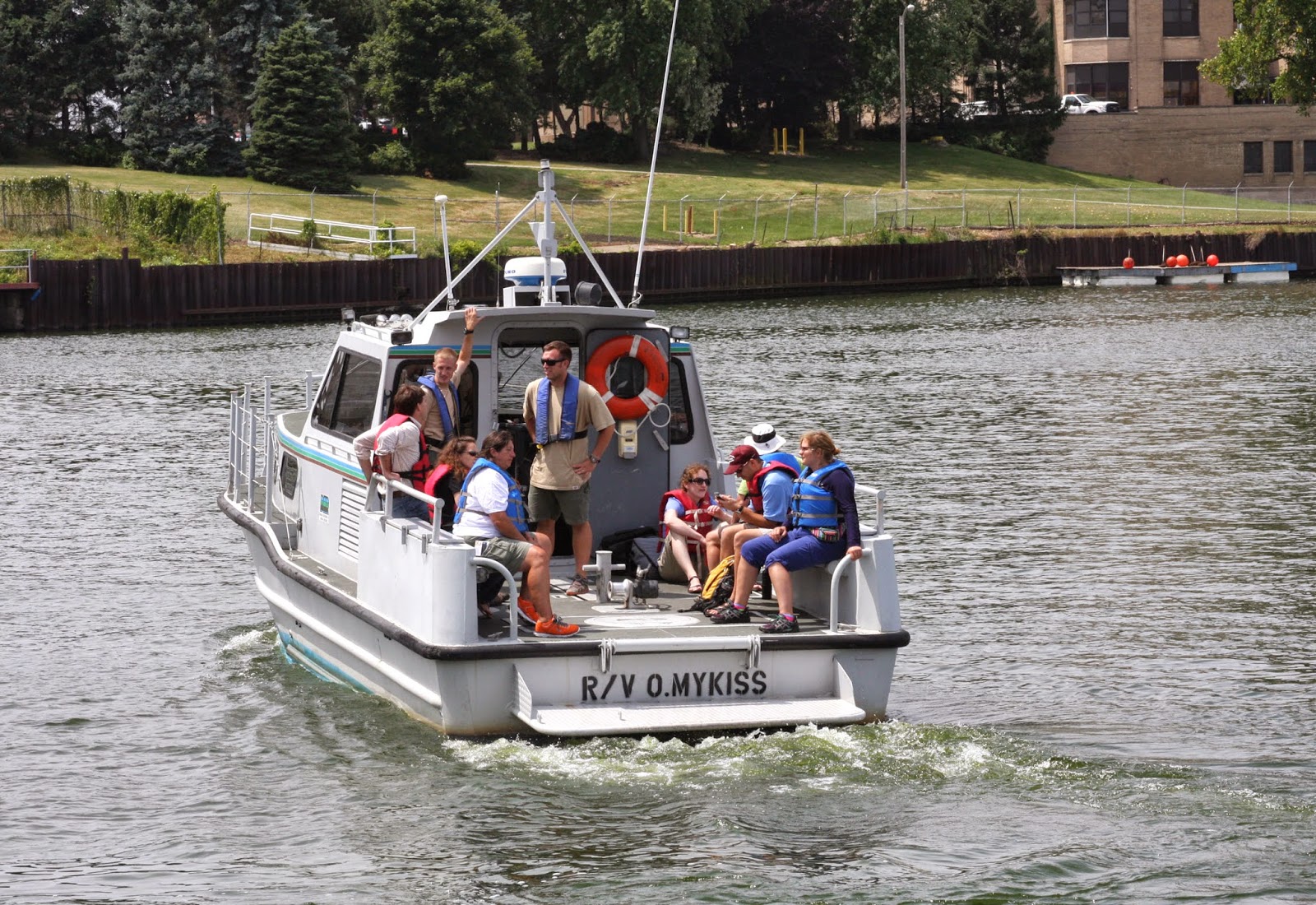 Fourteen teachers from Illinois and Indiana are hard at work developing new science lessons that incorporate real-time data from the Michigan City buoy after a training workshop held last week at Purdue North Central.
Fourteen teachers from Illinois and Indiana are hard at work developing new science lessons that incorporate real-time data from the Michigan City buoy after a training workshop held last week at Purdue North Central.
During the day-long workshop, IISG’s education and research teams, along with Purdue University’s Cary Troy
, introduced teachers to the environmental monitoring buoy, the data it collects, and how researchers are using the data to better understand the nearshore waters of Lake Michigan.
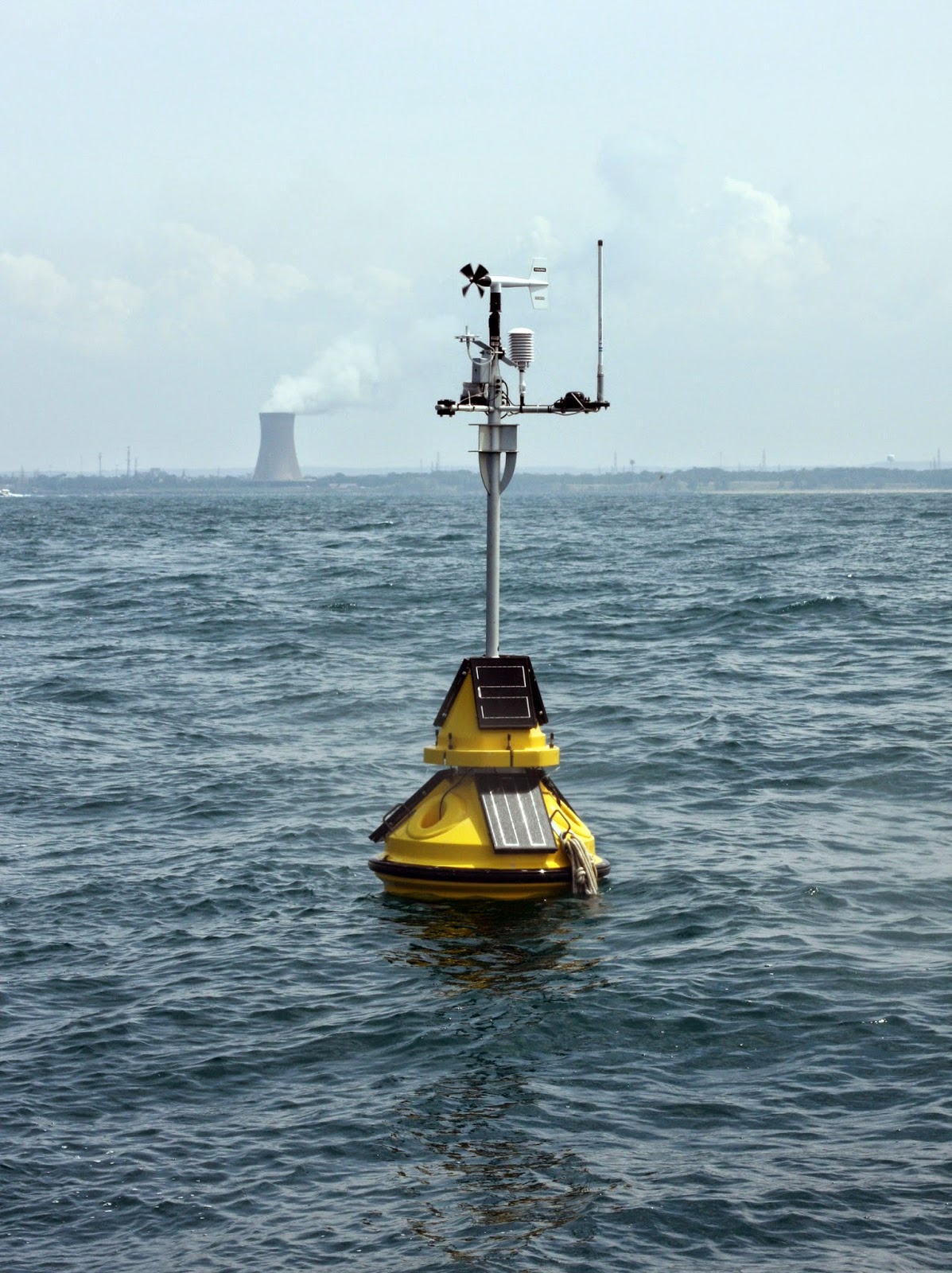 The highlight of the workshop for many was the boat ride four miles into Lake Michigan to see the buoy first-hand—in smaller groups due to the size of the boat. The trips also gave teachers the opportunity to talk more with researchers and staff from the Indiana Department of Natural Resources(DNR) about the buoy and other data collection methods used to monitor fisheries, understand lake dynamics, and improve water safety.
The highlight of the workshop for many was the boat ride four miles into Lake Michigan to see the buoy first-hand—in smaller groups due to the size of the boat. The trips also gave teachers the opportunity to talk more with researchers and staff from the Indiana Department of Natural Resources(DNR) about the buoy and other data collection methods used to monitor fisheries, understand lake dynamics, and improve water safety.
The teachers will work together to develop at least six curriculum activities that improve STEM education—science, technology, engineering, and math—and boost understanding of Great Lakes issues. These won’t be complete till early next year, but the teachers already have big ideas for how to integrate the buoy data into their classrooms.
Several hope to use information on wind speed and water currents to improve their weather units. Others plan to use data collected by the buoy’s thermistor chain, which measures temperatures at different depths, to pinpoint the likely habitats of specific fish species and determine whether invaders like Asian carp could make a home in Lake Michigan. Some even expressed interest in having students compare buoy data with environmental characteristics collected on land to better understand solar radiation and seasonal changes.
The final lesson plans will be available on the IISG website.
Funding for the workshop was provided in part by the Indiana DNR Lake Michigan Coastal Program. Special thanks to the DNR staff at the Michigan City field office for taking the participants out on the lake.
June 17th, 2014 by iisg_superadmin
The efforts of an Illinois teacher to bring Great Lakes science into the classroom were brought center stage in the latest edition of Teacher Features, a monthly online series that showcases outstanding educators in the Great Lakes region.
Eileen DeJong, a teacher at Suak Village’s Rickover Junior High, is one of 14 teachers from Illinois and Indiana who learned about local aquatic ecosystems and ideas for hands-on stewardship activities at last summer’s B-WET workshop. In this edition, she talks about the importance of raising awareness of Great Lakes issues, past classroom projects, and her plans for the future.
From Teacher Features:
1. Why do you think it’s important to infuse Great Lakes topics in education?
I think it’s important that I incorporate information about our Great Lakes into my teaching because our school is impacted in many ways by one of the Great Lakes (Lake Michigan). Students respond to information that makes sense to them and that affects their life, and because Lake Michigan is so close to us (within 45 minutes); it’s a great way to get students involved in current environmental issues. We can study about aquatic invasive species affecting Lake Michigan and then GO TO Indiana Dunes, for example, and conduct experiments there. Or … even closer to home, we can study about invasive species harming our local forests, and then GO TO nearby forest preserves and volunteer. It’s all about making connections. Studying the Great Lakes topics make science REAL for my students and helps foster natural curiosity about their surroundings. It is also important because the problem of invasive species is a current environmental issue, and it’s happening in our own backyard. It encourages my students to become knowledgeable about factors affecting their living environment and to become activists for change.
Continue reading at the link above.
Teacher Features is part of the Center for Great Lakes Literacy’s (CGLL) ongoing efforts to boost awareness of issues facing the Great Lakes watershed and inspire greater community stewardship. The group is led by Sea Grant educators throughout the region and conducts numerous teacher trainings each year, including the annual Shipboard Science workshop.
May 9th, 2014 by iisg_superadmin
Higher temperatures, extreme rainstorms, loss of wildlife, and a drop in Lake Michigan water levels. This is what the Midwest can expect in the coming decades according to the latest review of climate change trends.
Released on Tuesday, the
2014 National Climate Assessment provides an in-depth look at the expected impacts of climate change across the country. The report also investigates how businesses, agriculture, infrastructure, natural resources, and public health will be affected if current trends continue.
Midwesterners have likely noticed a few of the projected changes already. Summers are longer and warmer, winters are wetter, and flooding is increasing. But some of the long-term impacts might not be as apparent. For example, higher water temperatures could drive out fish species and make it easier for non-native species to invade new habitats. Stronger rainstorms, especially in cities, will also mean more runoff that pollutes waterways and erodes shorelines and river banks.
Visit our
climate change page for information on what communities and individuals can do to mitigate and prepare for the changing climate.
January 8th, 2014 by Irene Miles
School is back in session and that means science teachers across southern Lake Michigan will be turning their sights to the Great Lakes. For the AP Environmental Science class at Zion-Benton Township High School, though, the issues facing nearby Lake Michigan have been in focus since the start of the year.
Their teacher, Alex Stavropoulos, got the idea for some of his classroom and field activities after spending a week aboard the U.S. EPA R/V Lake Guardian this summer for the annual Shipboard and Shoreline Science Workshop. Alex wrote in to tell us what his class has been up to.
 Towards the beginning of the school year, my class spent about a month on our “Aquatic Habitats and Biodiversity” unit. After exploring the general nature of aquatic systems (both marine and freshwater), we took a closer look at our local water systems, specifically Lake Michigan. During this time, we discussed the history of the Great Lakes, identified the various ways in which humans have used and altered the makeup of the Great Lakes, spent two days conducting water-quality testing and macro-invertebrate sampling (using both biotic and abiotic indicators to compare water quality in various tributaries to that of the mouths in which they fed into Lake Michigan), and debated plausible methods to prevent invasive species such as the Asian Carp from entering the Great Lakes.
Towards the beginning of the school year, my class spent about a month on our “Aquatic Habitats and Biodiversity” unit. After exploring the general nature of aquatic systems (both marine and freshwater), we took a closer look at our local water systems, specifically Lake Michigan. During this time, we discussed the history of the Great Lakes, identified the various ways in which humans have used and altered the makeup of the Great Lakes, spent two days conducting water-quality testing and macro-invertebrate sampling (using both biotic and abiotic indicators to compare water quality in various tributaries to that of the mouths in which they fed into Lake Michigan), and debated plausible methods to prevent invasive species such as the Asian Carp from entering the Great Lakes.
 Throughout this entire unit, I found myself regularly referencing experiences I had during the Lake Guardian summer workshop. The experiences not only allowed me to better explain the complexity of some of these issues, but it also opened my students’ eyes to hands-on opportunities available in the world of science. It taught me a great deal about the Great Lakes, but, more importantly, it improved my ability to teach students about the Lakes’ significance. I hope this program continues to be funded for years to come as it is a wonderful way of spreading both knowledge and passion regarding the importance of preserving the gift that is the Great Lakes.
Throughout this entire unit, I found myself regularly referencing experiences I had during the Lake Guardian summer workshop. The experiences not only allowed me to better explain the complexity of some of these issues, but it also opened my students’ eyes to hands-on opportunities available in the world of science. It taught me a great deal about the Great Lakes, but, more importantly, it improved my ability to teach students about the Lakes’ significance. I hope this program continues to be funded for years to come as it is a wonderful way of spreading both knowledge and passion regarding the importance of preserving the gift that is the Great Lakes.
This year’s workshop will take place on Lake Erie. Keep an eye on our blog in the coming months for more details and application information.
October 22nd, 2013 by Irene Miles
Allison Neubauer, a University of Illinois Senior, was a summer intern with IISG’s Kristin TePas. Among the projects Allison worked on, she was part of the effort to develop a new website for the research vessel Lake Guardian. She wrote in to tell us more about her work this summer and her plans for the future following this internship experience.
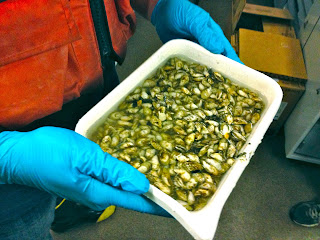 “As an indecisive, undeclared sophomore I enrolled in a course titled Environmental Sustainability. Though I registered with low expectations, I found myself completely captivated by the readings and discussions we had in class. By the end of the semester I knew environmental sustainability was a passion I wanted to pursue, and I declared a major in Earth, Society, and the Environment. I also added a Geography and GIS Major and Business Minor along the way. Studying and working in these fields has afforded me the opportunity to engage in a wide range of academic and extracurricular experiences that have truly shaped my outlook on the world and secured my commitment to responsibly addressing environmental issues.
“As an indecisive, undeclared sophomore I enrolled in a course titled Environmental Sustainability. Though I registered with low expectations, I found myself completely captivated by the readings and discussions we had in class. By the end of the semester I knew environmental sustainability was a passion I wanted to pursue, and I declared a major in Earth, Society, and the Environment. I also added a Geography and GIS Major and Business Minor along the way. Studying and working in these fields has afforded me the opportunity to engage in a wide range of academic and extracurricular experiences that have truly shaped my outlook on the world and secured my commitment to responsibly addressing environmental issues.

My internship with the Illinois-Indiana Sea Grant this summer has been the most rewarding experience of my collegiate career thus far. As the Great Lakes Education Intern I worked under the leadership of my mentor Kristin TePas to develop a website for the U.S. EPA research vessel Lake Guardian that effectively communicates the ship’s research and educational activities to the general public. The Lake Guardian is a unique and extremely valuable resource that has facilitated Great Lakes research for over 25 years, which in turn promotes better understanding and awareness of environmental issues affecting the lakes.
Kristin and I, through the creation of a user friendly Lake Guardian website, hope to expose teachers, students, and the general public to current Great Lakes research projects and inspire communication between scientists and their communities. By interviewing our target audience we determined what people wanted to see on the website and then developed some of the items they requested, including a ship specifications chart, science equipment videos, an ‘Ask a Scientist’ form, FAQ page, Science and Marine Career videos, as well as a YouTube channel and Flickr gallery to give a sense of life and work on the ship. The overarching goal is for the Lake Guardian site to be a fun and engaging way to compel people to be invested in the health and vitality of the Great Lakes.
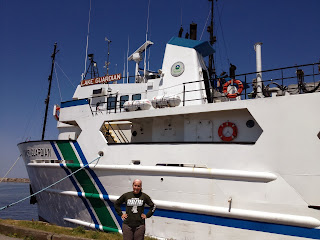 My experiences this summer have opened my eyes to the importance of protecting the Great Lakes, which had not previously been in the forefront of my environmental concerns. Even growing up in Chicago I took Lake Michigan for granted because I did not understand how fragile the Great Lakes ecosystem truly is, or how critical the Lakes are to people’s livelihoods. Increasing awareness is vital to conserving the Great Lakes, and my position with Illinois-Indiana Sea Grant this summer gave me great exposure to environmental outreach. I have thoroughly enjoyed my work, especially all the valuable input I received from an assortment of teachers, scientists, Lake Guardian crew, and Sea Grant staff. This internship has been an excellent growing experience for me. I have vastly improved my communication, planning, and organizing skills as well as enhanced my understanding of the Great Lakes.”
My experiences this summer have opened my eyes to the importance of protecting the Great Lakes, which had not previously been in the forefront of my environmental concerns. Even growing up in Chicago I took Lake Michigan for granted because I did not understand how fragile the Great Lakes ecosystem truly is, or how critical the Lakes are to people’s livelihoods. Increasing awareness is vital to conserving the Great Lakes, and my position with Illinois-Indiana Sea Grant this summer gave me great exposure to environmental outreach. I have thoroughly enjoyed my work, especially all the valuable input I received from an assortment of teachers, scientists, Lake Guardian crew, and Sea Grant staff. This internship has been an excellent growing experience for me. I have vastly improved my communication, planning, and organizing skills as well as enhanced my understanding of the Great Lakes.”
Allison is one of four interns who worked with IISG this summer.
October 18th, 2013 by Irene Miles
Emily Anderson graduated from Northern Illinois University this past spring and was able to put her studies to work right away as one of our summer interns. She wrote in to tell us about her experience working with Caitie McCoy on outreach and social science efforts related to sediment remediation.
“This summer I interned with Illinois-Indiana Sea Grant as the Human Dimensions of Natural Resources Intern. When I found the listing for the IISG Internship position I knew right away it was right for me. I was ecstatic to find a position that aligned with my interests in both psychology and environmental science, so I excitedly submitted my application and then waited nervously. Days after I walked across the stage as a 2013 graduate from Northern Illinois University, I relocated from DeKalb, Illinois to my new office on the University of Illinois’ campus.
Throughout the summer I traveled around the Great Lakes with my mentor Caitie McCoy and collected data on people’s perceptions of contaminated sediments. One of Sea Grant’s missions is to conduct research across the Great Lakes; as such, my job was to assist Caitie in conducting a study on two contaminated rivers slated for cleanup. In order to restore the health of the Great Lakes ecosystem and restore benefits to the local communities, the GLLA funds sediment remediation and habitat restoration in connecting waterways. The purpose of our research was to gain an understanding of how people in these communities relate to their river so that this information could be used to guide outreach efforts at these and other contaminated sites. We were also interested in the different benefits that communities receive from these waterways and how cleanup efforts might enhance those resources. In order to get a site-specific understanding we traveled to different locations and interviewed local leaders.
After learning about the background and purpose of the GLLA program, my first task was to recruit interview participants. I am rather shy normally, but conducting the recruitment communications and helping with the interviews was a great experience to break me out of my shell. I was pretty nervous during my first recruitment call, but after speaking with an extremely nice and generous person who invited us to go fishing during our interview I became much more comfortable. With help from our local outreach teams, we ended up with nearly 45 interviewees between our two sites (Duluth, MN and Sheboygan, WI).
I really love to travel, see new places, and learn new things so I have to say conducting the interviews was my favorite part of the internship. Both cities were beautiful in their unique way, and I’d definitely visit again if I got the chance. (In fact I’d consider living in Duluth despite an average of 80 inches of snowfall per year.) It was so interesting to get to listen to people’s stories and learn about the environmental issues in the Midwest. After the site visit I got right to work at transcribing the interviews which I will admit was not my favorite part of the experience but was a very valuable task and an opportunity to develop a new skill.
Before this internship most of the research I had been involved in was quantitative so the idea of data analysis guided by intuition was sort of foreign to me. At first I stumbled through the process but I found conceptual ground and eventually was able to enjoy qualitative analysis. Because of my concern for the health of the environment and my interest in social science it really gives me a great feeling to know that research like this is being conducted. In the end I feel accomplished; the study I helped with this summer will guide future outreach at the sites we visited and add to our understanding of the benefits of river cleanups. And ultimately that will help prove the real-world value and impact of programs like GLLA. This internship reaffirmed my passion for research and exposed me to a multitude of career options that are directly in line with my interests. I leave this position with a little more direction and a lot more hope for the future of the Great Lakes.”
Emily is one of four interns who worked with IISG this summer. You can read about Alice’s experience here, John’s here, and look forward to another post soon.
October 10th, 2013 by Irene Miles
John Saltanovitz, currently a senior at Purdue earning a bachelor’s degree in Natural Resources and Environmental Science, worked this past summer as a sustainable communities outreach intern with IISG’s Kara Salazar. He wrote in to detail his experience getting hands-on in the environmental science field.
 “When I started college, I was not aiming towards a career in environmental science. But as my classes progressed and I learned more about the topics, I realized how important the field was. There are so many issues that, if left ignored, could cause problems for future generations. Working to solve these problems is why I chose environmental science as my major. I learned about the internship with IISG from an email my department sent out, and it seemed like an amazing opportunity to get hands-on with the field I wanted to be involved in.
“When I started college, I was not aiming towards a career in environmental science. But as my classes progressed and I learned more about the topics, I realized how important the field was. There are so many issues that, if left ignored, could cause problems for future generations. Working to solve these problems is why I chose environmental science as my major. I learned about the internship with IISG from an email my department sent out, and it seemed like an amazing opportunity to get hands-on with the field I wanted to be involved in.
My specific focus was with community outreach. I worked with Kara on creating publications that could help communities be more aware of environmental problems and how to fix them. My main project was creating a zero waste guide that could be used for planning local events in the future. The guide helps to provide ideas and statistics behind zero waste events, how they work, and how to plan for them. My hope is that this document will encourage people in the community to work towards being more environmentally friendly.
My work this summer has showed me how much effort those in the outreach field put forth to help make a difference. I’ve always grown up around the Great Lakes, but this internship really opened my eyes to all of the different projects people are doing to assist and protect the Great Lakes region. Before this internship, the idea of research/outreach with the Great Lakes hadn’t crossed my mind, but this summer’s experiences have greatly increased my interest in and passion for the subject. I’ve learned that no problem is too small or unimportant when it comes to creating a better place to live and a healthier environment.
I plan on continuing my studies in environmental science and working towards a degree in environmental engineering. My internship showed me how many possibilities are out there and what can be accomplished with hard work. I’ve met so many great people through IISG who all have a passion for what they do. It was a blessing to be involved in an organization like IISG. The only downside is that the summer felt like it went by so fast. I wish that I could have had more time to continue working and networking in the field.”
John is one of four interns who worked with IISG this summer. You can look forward to additional posts soon.



